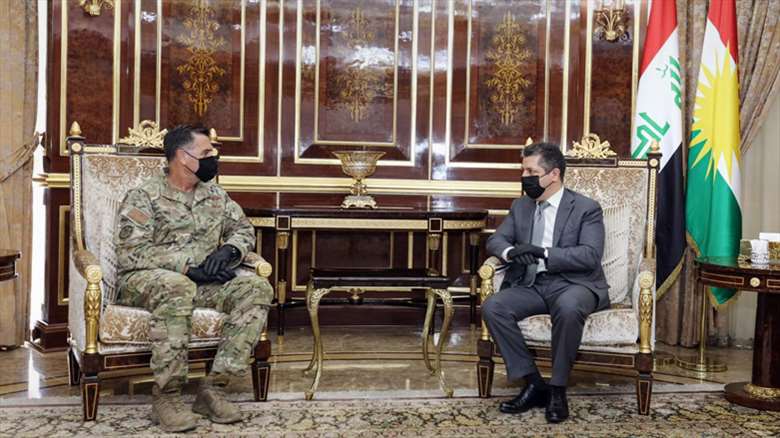Top Kurdistan Region officials meet anti-ISIS Coalition commander

ERBIL (Kurdistan 24) – Kurdistan Region Prime Minister Masrour Barzani on Saturday expressed his concern about a recent spike in the activities of the so-called Islamic State in a meeting with Maj. Gen. Eric T. Hill, commander of Special Operations Joint Task Force – Operation Inherent Resolve (SOJTF-OIR.).
"The two sides spoke about the latest developments in Iraq as well as the need to strengthen coordination between the Peshmerga and Coalition Forces. They stressed the importance of continued coordination in order to eliminate the ISIS threat," a statement from Barzani's office read.
The premier "expressed his concern about the latest ISIS activities in Kurdistani areas outside the Kurdistan Region particularly attacks on and abductions of Kurdish farmers."
Related Article: Two abducted Kurdish Kakai farmers found killed in Khanaqin
For his part, Maj. Gen. Hill stated that Kurdistan Region "is an important partner of the United States and Coalition Forces in the fight against terrorism."
"He agreed that the war on terror has not finished yet, underscoring the need to further strengthen coordination with the Kurdistan Region and Iraq in combating terrorism," the statement concluded.

The Coalition commander also met with Kurdistan Region President Nechirvan Barzani on Saturday. They discussed "the increasing dangers of ISIS terrorists' movements and assaults in Iraq and Syria, which have seriously undermined the security and stability of both countries," according to a statement from the president's office.
Related Article: SDF's Commander Abdi meets with US General to discuss anti-ISIS operations
The president "reiterated the importance of cooperative arrangements between the government of Iraq and the Kurdistan Region in confronting ISIS terrorists, particularly in the disputed territories."
President Barzani "also underlined that Iraq needs to take the necessary political steps to restore trust, security and stability among all communities in the country."
The two also spoke about the upcoming mid-June strategic Iraq-US dialogue that would decide the future bilateral relations. President Barzani "reiterated the importance of Kurdistan Region's presence and participation in the dialogue and in the formation of any road maps."
Despite Iraq declaring a "final victory" against the Islamic State in 2017, the terrorist group continues to launch sporadic attacks, including bombings, assassinations, and kidnappings in previously liberated areas.
In recent months, the terrorist organization has increased its activities across the country, most notably in disputed territories, targeting and killing dozens of civilians and members of the security forces.
In response, Iraqi forces have carried out a series of operations in rural areas where the Islamic State remnants continue to wage an insurgency. Recent US-led Coalition airstrikes have also killed several Islamic State leaders.
Read More: Iraq announces the killing of ISIS' governor of Iraq'
Top Kurdistan Region officials and Peshmerga commanders have issued repeated warnings to both the Iraqi government and the international community that the Islamic State remains active and capable of reasserting itself to continue its campaign of violence. A "security vacuum," as KRG officials have described it, has made the disputed areas in Diyala, Salahuddin, and Kirkuk more vulnerable to Islamic State attacks.
Editing By Khrush Najari
